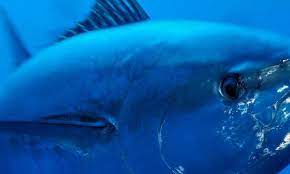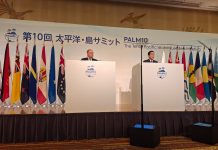PIFS ambassador urged Pacific to work together to advance interests in WTO and be more active in the discussions in putting forward issues that are common interest to our region
By Elenoa Dimaira
SUVA, 16 DECEMBER 2022 (PASIFIKA ENVIRO NEWS) — The Pacific was instrumental in the negotiation of the World Trade Organisation Agreement on Fisheries Subsidies (FSA) in June at the 12th Ministerial Conference (MC12) in Geneva.
Last month the Pacific Trade Ministers met in Nadi to consider the Pacific’s post-MC12. Pasifika Environews/PACNEWS spoke to the Pacific Islands Forum Secretariat ambassador in Geneva, Mere Falemaka.
1. You urged officials to actively work together to “determine how our engagement in the WTO and in the different discussions could benefit us so that the WTO can respond to the specific needs of the Pacific WTO members that comprise some of the smallest and most vulnerable Members, are Least Developed Countries, and are Net Food-Importing Developing Countries”. Have we achieved that?
We have been working together as Pacific WTO members in the Pacific Group- delivering joint statements in these discussions but obviously, this needs to be enhanced and we need to encourage our Pacific missions to be more active in the discussions in putting forward issues that are common interest to our region, particularly in light of the challenges that we are facing globally, on the food crisis and fuel crisis, as well as the inflationary effect that it’s having on the global economy, which is being felt now in the region. The Pacific needs to enhance its work. We have been working well to advance our interests in the WTO and we saw that with the achievement at MC12 to deliver an outcome on fishery subsidies, but certainly in the other areas of work, where we have an interest on food security to protect our food security, to make sure that we have access to vaccines to combat COVID-19 pandemic and future pandemics are protected going into the future.
2. There are two prominent points of discussion- the domestic ratification of the FSA to bring the Agreement into force. The second work stream is to restart the work in the second wave of the negotiations to address on the outstanding pillar, including overcapacity and overfishing. Have we started that ratification process, or do we have an idea whether nations are willing to ratify or not? Would the public be involved?
On the ratification that obviously is the decision that our members will have to make individually. As part of their domestic procedures, they are assessing the impact of this agreement, identifying the various policies and legislation that need to be amended as a result of this new agreement as part of their ratification process.
The domestic ratification, obviously it will be different for different members because some of them simply require Cabinet decision for the ratification to proceed. Others require Cabinet and Parliament to so that will obviously require a longer process.
On the second work stream on the future negotiations, that is something that the region is very committed to the negotiation on overcapacity and overfishing was not delivered as it was at MC 12.
And this is one of the most important pillars of the negotiations for the Pacific members because the large subsidising nations are the ones that are fishing in the Pacific waters. We, the Pacific members do not want those large fishing nations to be heavily subsidising their fleets, heavily subsidising their fishing in the Pacific that would result in the depletion of (fish) stocks.
And this is why this pillar on overcapacity is really critical for the Pacific to advance. The overcapacity and overfishing pillar is the most important because we want to ensure that those large distant water fishing nations that are fishing in our waters in the Pacific waters are not subsidising their fleets that will result in the depletion of the region’s fish stocks.
At the same time, we the Pacific, want to ensure that this agreement remain flexible for the Pacific members who may want to develop our fleet in future.
This agreement must not prevent them from using subsidies to develop their vessels or build their vessels in order to exploit their own fisheries. This is why we want we want strong discipline on the distant water fishing nations that are fishing, at the same time we want meaningful, special and differential treatment for our members because at the moment we are reliant on the distant water fishing nations fishing in our water supplying our canneries.
In future, our governments may want to say want to develop our own fleets using subsidies.
We want to secure the policy space now in this agreement through special and differential treatment, to enable them to make the decision in future to build their fleets so that they can exploit their own stocks, supply their canneries, and create jobs investment.
Going into MC13, we want to advance this negotiation as fast as possible to make sure that this discipline reflects our interests to make sure that there are effective disciplines for large fishing nations and also for countries like us that that we need to provide for sufficient policies to develop our fisheries in the future.
3. Many Pacific Island Countries have well-managed fisheries but small fleets, what flexibilities are proposed to ensure that they aren’t constrained from developing their fishing fleets now and into the future?
The fact that many of our members do not even have fleets, we rely on distant water fishing fleets, which are fishing in our waters.
We want to ensure that we secure in this agreement, the flexibility needed to allow our governments to exercise the policies for developing our fisheries fleet and developing our fisheries sector.
4. Under the agreement there are expansive notification requirements, something that developing countries, including here in the Pacific, have struggled to meet in the WTO. Is there a concern about being able to meet such requirements and especially in light of previous proposals tying Special and Differential Treatment to meeting them?
This agreement like other WTO agreements will come with notification obligations. That is part of the transparency function of the WTO. Notifications allows other members to keep abreast of what trade measures in place, that may affect their trade interest.
The notification in this agreement applies both to the subsidies that members will be using or are using. I think the additionality in this agreement is the notification on fisheries management measures. Something that we were fighting to discourage in this fishery subsidies agreement.
But I think the compromises that were made was that if members are subsidising their fisheries, then we need to know what the status of those books is. Because this agreement that was adopted at MC12 is about subsidies to IUU fishing and subsidies to stocks that are overfished.
The status of stocks, on fishery stocks that are being subsidised is an important notification obligation. I know this is going to be burdensome for many members, particularly the small members. This agreement will require some stock assessments by members, so at the moment, we have a robust fisheries stock assessments by SPC for our commercial tuna stocks and other and other related species, but not on all stocks. And we have a multispecies fishery. It’s very difficult for some of our members to undertake stock assessments for some of those fisheries particularly because we are in a multi fisheries and also some stocks are small. It’s very difficult to undertake regular stock assessments.
So these are some of the challenges that the Pacific will face in terms of notification. Fishing companies and fishing operators, fishers will need to also be trained on this notification, on the kind of data they need they need to collect in order for our governments to compile the required data for notification.
The good thing about the fisheries’ related notification is that it is on a best endeavour’s requirement. It’s not mandatory, the wording for it is “to the extent possible” we notify the status of stocks that are being subsidised or the catch data, catch levels. So it’s to the extent possible. So I think that provides the flexibility if we are not able to do it, and we are not going to be taken to a WTO dispute settlement.
But nevertheless, I think it is important that we build the capacity to undertake the required data gathering and notification requirements because it will help policymakers, fisheries ministries to better manage our fisheries and better manage the countries that are fishing in our waters and are using subsidies. So for that, we obviously will need technical assistance and capacity building. There is under this agreement, the fishery subsidies agreement, a technical assistance and capacity building fund, a fish fund that will become available to help members with the implementation.
At the moment, the pledges are up to US$10 million. Obviously, the WTO is working to increase them. There have been indications of interest by donors, including some multilateral agencies like the World Bank and others to support the fund.
And there, of course, big developing countries who may not need these funds, they can do this themselves. But for small countries like us that have limited resources, these funds would be useful for us to support our implementation efforts including those relating to notification.
SOURCE: PASIFIKA ENVIRO NEWS/PACNEWS


















